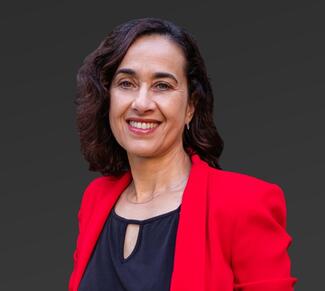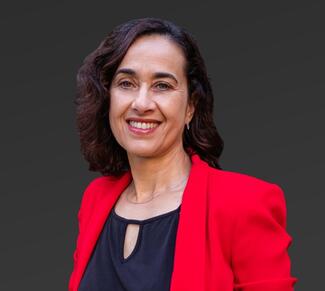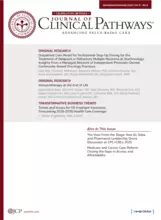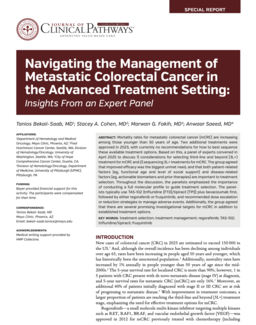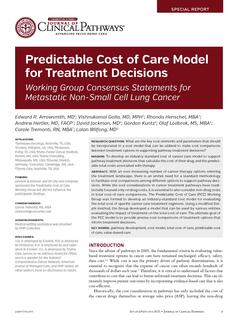Real-World Insights From Community Oncology Reveal Gaps in Early-Onset CRC Care
At ASCO 2025, Jessica Paulus, ScD, presented one of the largest real-world studies to date on early-onset colorectal cancer, revealing significant racial and ethnic disparities, later-stage diagnoses, and higher distress levels in younger patients—findings that underscore the urgent need for earlier screening, risk-based interventions, and supportive care tailored to this vulnerable population.
Jessica Paulus, ScD: My name is Jess Paulus. I'm the senior director of real-world research at Ontada, which is a real-world evidence oncology technology company headquartered in Boston. I'm trained as a cancer epidemiologist. I am delighted to talk through this work with you.
Can you provide an overview of your study that is being presented at ASCO 2025?
Paulus: Just to set the stage for this work, the backdrop is that there is growing recognition that we're dealing with an epidemic of early-onset colorectal cancer. By early-onset, I mean patients who are diagnosed under the age of 50. We've seen data that rates of early-onset colorectal cancer are rising in the United States and around the world, in low- and middle-income countries, as well as high-income countries. That's the backdrop, because there is a lot of attention and concern about these rising rates in younger patients.
There have also been investigations into why we think this might be happening and, in particular, the role of social determinants of health, like patient race, ethnicity, geographical or residential region, and different measures of health care access. It seems that in individual studies, there is definitely an impact of social determinants on the incidents of early-onset colorectal cancer as well as potentially worse outcomes.
To date, there really haven't been large-scale evaluations with large data that are covering wide geographical regions and large numbers of patients. So, we had an opportunity to do that by leveraging real-world data that's emanating from one of the biggest community oncology treatment and research networks in the US, the US Oncology Network.
We specifically used electronic health record data from that treatment and research network to ask 2 different questions. The first was to characterize the sociodemographic and clinical factors that are associated with early-onset colorectal cancer as compared to what I'm calling average-onset colorectal cancer, which is just diagnosis after age 50. The second goal was to try to describe the overall survival experience of patients with early-onset vs average-onset, including trying to tease out impacts of social determinants.
That was a bit about the background of this work and what motivated us to do this study. We ended up having, almost 105 000 patients with colorectal cancer in this investigation. Among those, [we had] almost 15 000 patients with early-onset colorectal cancer. Again, that's diagnosis under age 50. This makes this one of the biggest investigations of early-onset colorectal cancer to date.
Your study found higher representation of racial and ethnic minorities in the early-onset colorectal cancer group. What implications might this have for screening guidelines or outreach efforts targeting younger populations?
Paulus: The screening question is a pressing one given the data here. We found, as you mentioned, overrepresentation of patients of American Indian, Alaskan Native, Asian, and Black race, as well as Hispanic ethnicity, in the early-onset group vs the average-onset group.
To talk through what that looks like, we found that about 11% of the early-onset cases were of Black race as compared to only 3% of the average-onset cases. Similarly, 12% of the early-onset cases were of Hispanic or Latino ethnicity vs only about 8% of the average-onset cases.
There is one other result that I think is important to talk about with respect to screening, and that's that we found a pretty significant difference in the stage of disease at initial diagnosis for the early-onset patients vs the later-onset patients or the average-onset patients.
We saw about a 10-percentage point difference between early-onset vs average-onset for patients that were diagnosed at either stage III or IV. We saw that almost 70% of the younger patients were diagnosed at stage III or IV as compared to only about 60% of the average-onset cases.
This points to an opportunity for screening to reduce the stage at initial diagnosis for all patients. But particularly for the early-onset group, there is a clear opportunity. There is a clear disparity in the stage of disease at initial diagnosis for those early-onset patients as compared to the average-onset patients.
In terms of practice and policies that we could think through about this, currently, the age for population screening for colorectal cancer has been relatively recently reduced to 45 years. However, in our study, half of the early-onset patients with cancer were diagnosed under the age of 44. That was the median age of diagnosis for the early-onset colorectal cancer group. All of those patients wouldn't have qualified for population screening under current guidelines.
We also know that there is a diagnostic delay for the early-onset patients as compared to the average-onset patients. We know this from external data. It wasn't directly addressed in this investigation, but I've seen studies indicating there is a 6-month greater interval between first symptom and definitive diagnosis for early-onset patients vs the average-onset patients.
As you appropriately pointed out, this is an important opportunity to reduce that diagnostic delay. That would be the work of general practitioners, primary care, and other kinds of hospitalist-type settings rather than oncology settings, because this is what happens before patients get to an oncologist. It's moving through that diagnostic journey. There needs to be a better way to flag some of these patients and get them to definitive diagnosis sooner.
Some of the other things that this work points to is considering risk-based approaches, algorithms to flag some younger patients for screening modalities, even if they're under the population-based screening age. You mentioned race and ethnicity—that could certainly be part of a risk-based algorithm to flag patients who might be at higher risk. We also saw a higher prevalence of obesity among the early-onset patients vs the average-onset patients. That could be another component of some type of clinical risk-based strategy to flag certain patients for earlier screening.
There's a template for this. We have seen this successfully done for lung cancer screening in the United States. In that case, there are approaches to flag certain patients with a degree of tobacco history for screening that isn't necessarily recommended at a population level. That's something that could certainly be done here for younger patients at risk for colorectal cancer.
Are there specific interventions—whether policy-based, clinical, or payer-driven—that you believe could close the disparity gap identified in your study?
Paulus: Our work points to the need for stronger public health infrastructure that is helping patients get diagnosed sooner. Again, reducing that diagnostic delay [is important], as well as thinking through how to expand screening strategies for patients who are younger, for patients that fall below that population-based screening threshold of 45 years old, but still may be at elevated risk. That could also lead to a stage shift in this younger population to be less likely to be diagnosed as stage III or IV, where survival outcomes are just not as favorable.
What role do you see community oncology networks playing in piloting or scaling interventions for early-onset colorectal cancer moving forward?
Paulus: One of the findings from this study actually had to do with measuring the distress level of patients with early-onset vs average-onset colorectal cancer. In the US Oncology Network, there is an instrument that measures patient distress that was developed by the National Comprehensive Cancer Network. This is a widely validated tool that assesses patient-reported overall as well as physical, emotional, psychosocial, and practical sources of distress.
In our study, we found that the early-onset patients were reporting higher levels of distress than the average-onset patients. This is not necessarily surprising given that we saw that these patients are also more likely to be diagnosed at advanced stages of disease.
This is an important opportunity for the community oncology networks of the United States and beyond to consider the unique needs of this patient population. We know that higher levels of distress are associated with more adverse outcomes and worse survival for patients with cancer. The US Oncology Network has a system embedded, so the distress of patients is assessed and then there are certain interventions tailored to the source of the patient's distress that are brought in to meet the patient, which can be associated with better treatment adherence and also, hopefully, better survival outcomes.
That's just a vignette about how the early-onset colorectal cancer patients may have unique needs that need to be met to improve outcomes overall.






